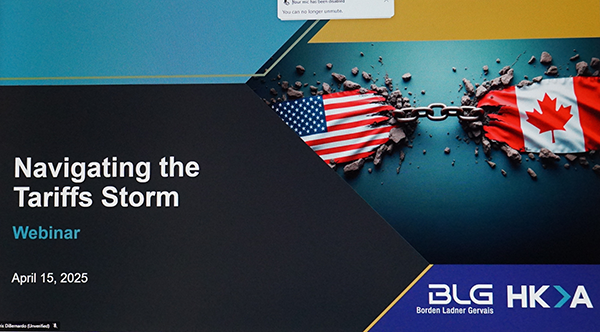The one constant of U.S. President Donald Trump’s tariff plan seems to be that it is in a constant state of flux, a reminder to building contractors that they can’t even momentarily take their eyes off the latest news.
“The time is now to start planning for what those impacts could possibly be and develop the mitigation strategies and tracking mechanisms…so that as they (tariffs) evolve in real time you are prepared to deal with them,” said Rick Moffat, head of operations at HKA Canada, a global consultancy in risk mitigation, dispute resolution, expert witness and litigation support services.
Moffat moderated a webinar panel recently on legal and practical strategies for managing the impacts of the tariffs on construction projects in Canada.

Notable reciprocal tariffs affecting construction include steel, aluminum and softwood lumber, but there are other impacted goods crossing the border regularly affecting project costs and schedules, Moffat said.
According to HKA’s CRUX, an integrated research program providing common causes of claims and disputes in engineering and construction, about 12 per cent of projects in the Americas have faced material delays.
“It is safe to assume” delays and disruptions will increase because of the tariffs, Bulut Cinar, a director at HKA, told the webinar audience.
Stressing the importance of detailed contingency plans that account for potential cost hikes caused by tariffs, Cinar said contractors would benefit by including “multiple scenarios” illustrating how their contingencies help manage their costs.
The webinar was a joint presentation by HKA and BLG. Syed Ali, director of HKA, was a co-presenter with Cinar at the webinar.

Dan Boan, partner at BLG, told the webinar audience contractors need to stay on top of every provision in a contract.
“So often we get the contract, sign it and put it in a drawer and don’t look at it until later.”
He told contractors to address the impact of tariffs on the contract schedule with the owner on arising circumstances such as a change in supply in which long-lead materials need to be sourced offshore, causing schedule delays.
If an owner directs a change resulting from the tariffs, it might be a compensable delay for the contractor, but if the contractor directs a change it is less clear if they will be entitled to compensation for a delay, he said.
Boan advised contractors to negotiate a change order package with the owner that shows it will save the owner money, but the agreement should include that the contractor requires compensation for delays resulting from the tariffs.
If contractors consider delay-causing tariffs a force majeure event (an unforeseen and uncontrollable event preventing contractual obligations from being fulfilled) but the contract deals with tariffs differently they might be “precluding themselves” from compensation, he added.
“You have to be careful to check your contract, check your express provisions before writing those notice letters.”
Rebecca Torrance, a construction and infrastructure lawyer and senior associate at BLG, said the language of the standard CCDC-2 Stipulated Price Contract “appears to suggest” if taxes and duties go up or down after bid closing the contract price goes up or down accordingly.
Torrance cautions contractors, however, to look carefully at the supplementary conditions when reviewing the main contract.
Boan said the wording of Ontario’s recently published procurement restriction policy on U.S.-based businesses bidding on public sector procurements leaves some unanswered questions. A case in point is where there are exemptions such as when a U.S. company is the only “viable source” and procurement can’t be delayed.
“It is not clear that if you can get it (product) in Canada for, say, $1 million, but you can get in the States for $250,000, is that considered a viable source?”
Clarity is also needed on whether a “Canada Inc.” company of a U.S. company is exempt under the rules, he added.












Recent Comments